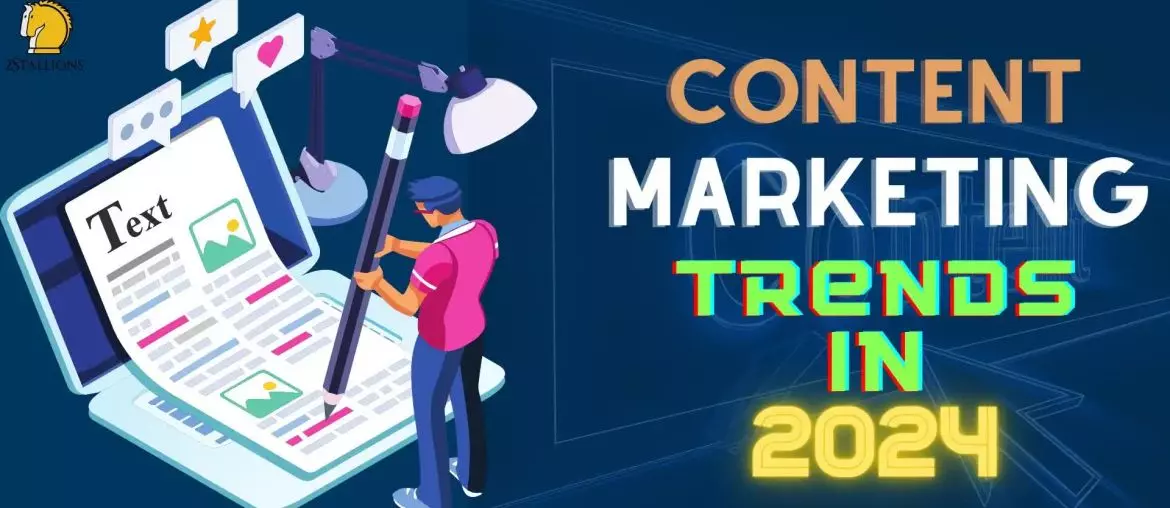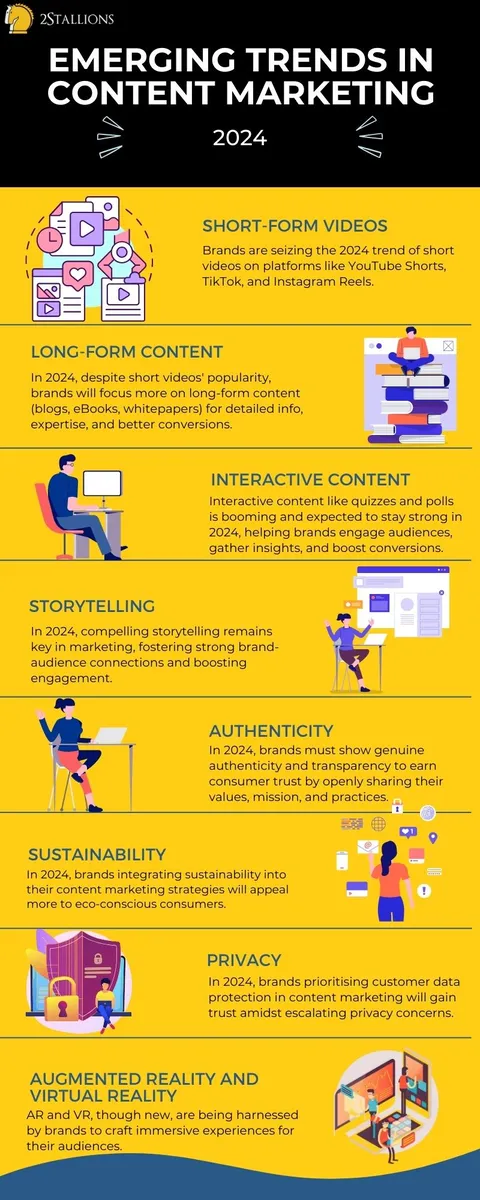Content marketing has become an integral part of any business’s marketing strategy. With the constantly evolving digital landscape, it is important to stay up-to-date with the latest trends and emerging technologies to stay ahead of the competition. As we approach 2025, it is important to analyze the current state of content marketing and predict the trends that will shape the industry in the coming years.
Understanding Content Marketing in 2025
Content marketing involves creating and distributing valuable, relevant, and consistent content to attract and retain a clearly defined audience. In 2025, content marketing will continue to evolve as businesses strive to connect with their audience in new and innovative ways. With the rise of new technologies and the increasing importance of personalization, businesses will need to adapt their content strategies to stay relevant and engaging.
Emerging Trends in Content Marketing
As we approach 2025, several emerging trends are shaping the future of content marketing. These include the role of AI in content marketing, the importance of personalization, video content marketing, social media and content marketing, data-driven content marketing, and conversational marketing and messaging. By leveraging these trends, businesses can create engaging and personalized content that resonates with their target audience.
Key Takeaways
- Content marketing will continue to evolve in 2025, with businesses adapting their strategies to stay relevant and engaging.
- Emerging trends such as AI, personalization, and video content marketing will shape the future of content marketing.
- By leveraging these trends, businesses can create engaging and personalized content that resonates with their target audience.
Understanding Content Marketing in 2025
Content marketing has become an essential component of any successful marketing strategy. In 2025, it will continue to play a critical role in engaging and retaining customers, building brand awareness, and driving revenue growth. To stay ahead of the competition, businesses must understand the latest trends and best practices in content marketing.
One of the most significant trends in content marketing in 2025 is the dominance of video content. Platforms like TikTok, YouTube, and Instagram Reels are driving the popularity of short-form video content. Companies must create engaging and informative videos that capture the attention of their target audience and provide value.
Another trend in content marketing is the rise of thought leadership content. Businesses must position themselves as experts in their industry by creating high-quality content that provides valuable insights and solutions to their customers’ problems. This includes whitepapers, case studies, and research reports that showcase their expertise and thought leadership.
In-person events and digital events will also continue to play an essential role in content marketing in 2025. Companies must create engaging and informative events that provide value to their target audience. This includes webinars, conferences, and workshops that provide insights, solutions, and networking opportunities.
Finally, personalization and customization will become increasingly important in content marketing in 2025. Companies must create personalized content that resonates with their target audience and meets their specific needs and preferences. This includes personalized emails, product recommendations, and content that is tailored to their interests and behaviours.
Overall, businesses must stay up-to-date with the latest trends and best practices in content marketing to remain competitive in 2025. By creating engaging and informative content that provides value to their target audience, they can build brand awareness, drive revenue growth, and position themselves as thought leaders in their industry.
Emerging Trends in Content Marketing
As we approach 2025, the content marketing landscape is set to evolve with emerging trends and new technologies. Here are some of the trends that are likely to shape the industry:
Short-Form Videos
Short-form videos have been on the rise for a while now, and this trend is set to continue in 2025. Brands are using platforms like YouTube Shorts, TikTok and Instagram Reels to connect with their audiences through engaging and entertaining videos. This trend is particularly popular among younger audiences, and brands are leveraging it to build brand awareness and drive engagement.
Long-Form Content
While short-form videos are gaining popularity, long-form content is still relevant. In 2025, we can expect to see more brands investing in long-form content like blog posts, eBooks, and whitepapers. Long-form content allows brands to provide in-depth information to their audiences, establish thought leadership, and drive conversions.
Interactive Content
Interactive content like quizzes, polls, and assessments have been gaining popularity in recent years, and this trend is set to continue in 2025. Interactive content allows brands to engage their audiences in a more meaningful way, gather valuable data, and drive conversions.
Storytelling
Storytelling has always been an important aspect of content marketing, and it will continue to be so in 2025. Brands that can tell compelling stories that resonate with their audiences will be able to build stronger connections and drive engagement.
Authenticity
Consumers are becoming increasingly sceptical of brands that don’t seem authentic. In 2025, brands that can demonstrate authenticity and transparency will be more likely to build trust with their audiences. This includes being open about their values, mission, and practices.
Sustainability
Sustainability is becoming an increasingly important issue for consumers, and brands that can demonstrate their commitment to sustainability will be more likely to win over environmentally conscious audiences. In 2025, we can expect to see more brands incorporating sustainability into their content marketing strategies.
Privacy
As privacy concerns continue to grow, brands that can demonstrate their commitment to protecting their customers’ data will be more likely to build trust and loyalty. In 2025, we can expect to see more brands prioritizing privacy in their content marketing strategies.
Augmented Reality and Virtual Reality
Augmented reality (AR) and virtual reality (VR) are still relatively new technologies, but they are already being used by some brands to create immersive experiences for their audiences. In 2025, we can expect to see more brands experimenting with AR and VR to create engaging and memorable content.
Overall, the content marketing landscape is set to evolve in 2025 with new technologies and emerging trends. Brands that can stay ahead of the curve and adapt to these changes will be more likely to succeed in the years to come.
The Role of AI in Content Marketing
Artificial Intelligence (AI) is transforming the content marketing landscape, and its impact is expected to grow significantly in 2025 and beyond. AI technologies are enabling marketers to create more personalized and engaging content, improving customer experiences, and driving better results.
Generative AI, such as chatbots and AI-driven interactions, is enabling businesses to create tailored content recommendations for their customers. These AI technologies can analyze customer data to understand their preferences and behaviours, and then generate content that is more likely to resonate with them. This allows businesses to provide customers with more personalized experiences, which can lead to increased engagement and loyalty.
AI is also helping marketers to optimize their content for search engines. AI-driven content analysis tools can identify relevant keywords and phrases, and suggest ways to improve content structure and formatting. This can help businesses to improve their search engine rankings and drive more traffic to their websites.
Another way that AI is transforming content marketing is through the use of tailored content recommendations. AI algorithms can analyze a customer’s browsing history, purchase behaviour, and other data to recommend content that is relevant to their interests. This can help businesses to increase engagement, build brand awareness, and drive more sales.
In conclusion, AI is playing an increasingly important role in content marketing, and its influence is only expected to grow in 2025 and beyond. By leveraging AI technologies, businesses can create more personalized and engaging content, improve customer experiences, and drive better results.
Importance of Personalisation
Personalisation has been a buzzword in marketing for some time, but it’s set to become even more important in 2025. Consumers are increasingly expecting personalized experiences, and businesses that can deliver these will have a competitive edge.
Hyper-personalization takes personalization to the next level. It involves using data and AI to create highly tailored experiences for individual users. This could involve anything from personalized emails to tailored product recommendations. In 2025, hyper-personalization is set to become the norm, as businesses strive to stand out in a crowded market.
Personalized content is also becoming increasingly important. Users are bombarded with content from all angles, and businesses that can deliver personalized content that speaks directly to their interests and needs will be the ones that succeed.
User behaviour data is key to delivering effective personalization. Businesses need to be able to track user behaviour across multiple channels and touchpoints and use this data to create personalized experiences that meet their needs. This requires a deep understanding of user behaviour and a willingness to invest in the tools and technologies needed to collect and analyze this data.
In summary, personalization is no longer an option in the digital marketing world – it’s an essential strategy brands need to engage, attract, and keep customers loyal. With customer expectations constantly evolving, staying ahead of emerging trends is important in creating positive customer experiences.
Video Content Marketing
Video content marketing continues to dominate the content marketing scene. According to a Forbes article, by 2025, videos will make up 82% of all consumer internet traffic. This is a significant increase from the current percentage of 66%.
YouTube and Instagram are two of the most popular platforms for video content marketing. YouTube has over 2 billion monthly active users, making it the second most visited website in the world. Instagram has over 1 billion monthly active users, and its short-form video feature, Instagram Reels, has gained popularity among users and brands alike.
In 2025, it is predicted that YouTube Shorts and Instagram Reels will continue to grow in popularity, providing brands with an opportunity to create short, engaging video content that can be easily consumed by their audience.
It is important for brands to focus on creating high-quality video content that is both informative and entertaining. This will help them stand out from their competitors and capture the attention of their target audience.
Overall, video content marketing will continue to be a crucial component of any successful content marketing strategy in 2025. Brands that invest in creating high-quality video content and promoting it on the right platforms will be able to reach and engage with their target audience effectively.
Social Media and Content Marketing
Social media has become an essential part of content marketing, and it is expected to continue to be in 2025. Platforms like Instagram and TikTok will continue to be popular and provide opportunities for businesses to reach their target audience.
One trend that is expected to continue is the use of user-generated content (UGC). UGC is content created by customers or followers of a brand, and it can be more authentic and engaging than traditional marketing content. In 2025, businesses are expected to continue to encourage UGC and use it in their social media and content marketing strategies.
Another trend that is expected to continue is the use of video content. Platforms like TikTok and Instagram Reels have made short-form video content more popular than ever, and businesses are expected to continue to incorporate video into their content marketing strategies in 2025.
In addition to using social media platforms to distribute content, businesses are also expected to use social media for customer engagement. Social media provides a way for businesses to communicate directly with their customers and respond to their questions and concerns.
Overall, social media is expected to continue to be a vital component of content marketing in 2025. Businesses that incorporate social media into their content marketing strategies will be better positioned to reach and engage with their target audience.
Data-Driven Content Marketing
In 2025, content marketing is expected to become even more data-driven. Companies will be using big data and analytics to create more targeted and personalized content. Data-driven insights will help marketers understand their audience better and create content that resonates with them.
Marketing analytics will play a crucial role in this process. Marketers will use data to measure the effectiveness of their content and make necessary changes to improve it. They will also use data to identify trends and patterns in their audience’s behaviour and preferences.
One of the key benefits of data-driven content marketing is that it allows companies to create more relevant and useful content. By analyzing data, marketers can identify the topics and formats that their audience prefers. They can also use data to personalize content for individual users, making it more engaging and effective.
Data-driven content marketing also enables companies to measure the ROI of their content marketing efforts more accurately. By tracking metrics like engagement, conversion rates, and revenue, marketers can determine the impact of their content on the bottom line.
Overall, data-driven content marketing offers a more strategic and effective approach to content creation. By leveraging data and analytics, companies can create content that resonates with their audience and drives results.
Content Strategies for Audience Engagement
In 2025, audience engagement will remain a critical component of content marketing. Brands will need to create content that not only educates and entertains but also fosters a sense of community and encourages user participation.
One effective strategy for audience engagement is user-generated content (UGC). UGC refers to any content created by users, such as reviews, testimonials, and social media posts. Brands can leverage UGC to build trust with their audience, as it provides social proof that their products or services are valuable. In 2025, we can expect to see more brands incorporating UGC into their content strategies.
Another way to foster audience engagement is through content experiences. Content experiences are immersive, interactive, and personalized experiences that allow users to engage with a brand’s content in a more meaningful way. For example, a brand could create a quiz that helps users determine which of their products is best suited for their needs. By creating content experiences that are tailored to their audience, brands can increase engagement and build stronger relationships with their customers.
To ensure that their content resonates with their audience, brands will need to take a data-driven approach to content creation. This means analyzing user data to understand what types of content their audience is most interested in and tailoring their content strategy accordingly. By using data to inform their content strategy, brands can create content that is more relevant and engaging to their audience.
Overall, in 2025, brands will need to focus on creating content that fosters audience engagement. By leveraging UGC, creating content experiences, and taking a data-driven approach to content creation, brands can build stronger relationships with their audience and increase engagement.
The Power of Authentic Storytelling
In 2025, authenticity will be a key driver of successful content marketing. Consumers are becoming increasingly savvy and can quickly recognize when brands are not being genuine. Therefore, brands need to embrace authentic storytelling to build trust with their audience.
Authentic storytelling is about sharing real, relatable stories that resonate with the audience. It is not about creating a polished, perfect image of the brand, but rather about being honest and transparent. By sharing stories that are authentic, brands can build trust with their audience and create a deeper connection.
One way to incorporate authentic storytelling into content marketing is by highlighting the people behind the brand. Sharing stories about the team members, their experiences, and their passions can help humanize the brand and make it more relatable. This approach can also help showcase the brand’s values and mission, which can further build trust with the audience.
Another way to incorporate authentic storytelling is by sharing customer stories. By highlighting the experiences of real customers, brands can show how their products or services have made a positive impact on people’s lives. This approach can help build social proof and make the brand more trustworthy in the eyes of potential customers.
In conclusion, authentic storytelling is a powerful tool that can help brands build trust with their audience. By sharing real, relatable stories, brands can create a deeper connection with their customers and differentiate themselves from competitors. In 2025, it will be essential for brands to embrace authentic storytelling to succeed in content marketing.
Conversational Marketing and Messaging
In 2025, conversational marketing is expected to become a crucial aspect of content marketing. Conversational marketing involves real-time, one-on-one conversations between businesses and customers. This approach allows businesses to engage with their customers on a personal level, providing them with a more customized experience.
One of the key components of conversational marketing is messaging. Messaging allows businesses to communicate with their customers directly, in real-time. With messaging, customers can ask questions, provide feedback, and receive support from businesses. Messaging can take place on a variety of platforms, including social media, messaging apps, and chatbots.
Chatbots are another important aspect of conversational marketing. Chatbots are computer programs that use artificial intelligence to simulate human conversation. They can be used to provide customer service, answer questions, and even make sales. Chatbots are becoming increasingly popular, as they allow businesses to provide 24/7 support to their customers.
Overall, conversational marketing and messaging are expected to become increasingly important in 2025. By providing customers with personalized experiences and real-time support, businesses can build stronger relationships with their customers and increase customer loyalty.
Challenges in Content Marketing
Content marketing is an ever-evolving field that requires constant effort and attention. As such, it comes with its own set of challenges. In 2025, content marketers will face several challenges that they must overcome to succeed.
One of the biggest challenges in content marketing is creating high-quality content that stands out from the crowd. With so much content being produced every day, it can be difficult to create something unique and valuable to the target audience. This requires a lot of research and resources to create content that is both informative and engaging.
Another challenge is the need to constantly adapt to new trends and technologies. As new platforms and formats emerge, content marketers must be able to keep up with the latest trends to stay relevant. This requires a lot of research and resources to stay up-to-date with the latest trends and technologies.
Content marketers must also be able to measure the effectiveness of their content marketing efforts. This requires a lot of resources and research to track and analyze metrics such as engagement, traffic, and conversions. Without proper measurement, it can be difficult to determine the ROI of content marketing efforts.
Finally, content marketers must be able to allocate resources effectively. With so many different channels and platforms available, it can be difficult to determine where to focus resources to get the best results. This requires a lot of research and analysis to determine which channels and platforms are most effective for reaching the target audience.
In summary, content marketing in 2025 will require a lot of resources, research, and adaptability to overcome the challenges of creating high-quality content, keeping up with new trends and technologies, measuring effectiveness, and allocating resources effectively.
The Impact of Sustainability and Social Responsibility
As the world becomes more aware of the impact of human activities on the environment, sustainability and social responsibility are becoming increasingly important for businesses. In 2025, content marketing will continue to reflect this trend, with more companies focusing on ways to reduce their environmental impact and promote social responsibility.
One of the key ways that businesses can promote sustainability is through their content marketing. For example, they can create content that highlights their efforts to reduce waste, use renewable energy sources, or support sustainable agriculture. By doing so, they can demonstrate their commitment to sustainability and attract customers who share their values.
Similarly, social responsibility is becoming more important for businesses. Consumers are increasingly concerned about issues such as human rights, fair labour practices, and diversity and inclusion. As a result, companies that prioritize social responsibility are more likely to attract and retain customers.
In 2025, content marketing will reflect this trend, with more companies creating content that highlights their commitment to social responsibility. For example, they may create content that showcases their efforts to promote diversity and inclusion in the workplace or their support for charitable causes.
Overall, the impact of sustainability and social responsibility on content marketing in 2025 is likely to be significant. Companies that prioritize these issues are likely to be more successful in attracting and retaining customers who share their values.
Leveraging Multiple Channels in Content Marketing
In 2025, content marketing is expected to leverage multiple channels to reach and engage with customers. By utilizing various channels, businesses can ensure that their message is seen by a wider audience and increase the chances of converting leads into customers.
One of the most effective ways to leverage multiple channels is through email newsletters. Email newsletters are a great way to keep customers informed about new products or services, promotions, and upcoming events. They also provide an opportunity to build a relationship with customers by providing valuable content that is relevant to their interests.
In addition to email newsletters, businesses can also leverage social media platforms to reach a wider audience. Social media platforms such as Facebook, Twitter, and Instagram are great for sharing content and engaging with customers. By creating engaging posts and responding to customer comments, businesses can build a loyal following and increase brand awareness.
Another way to leverage multiple channels is through video content. Video content is becoming increasingly popular, and businesses can use it to showcase their products or services more engagingly. By creating high-quality videos that are both informative and entertaining, businesses can increase engagement and build a stronger connection with their audience.
Overall, leveraging multiple channels in content marketing is essential for businesses looking to reach and engage with customers in 2025. By utilizing email newsletters, social media platforms, and video content, businesses can increase their reach and build a stronger connection with their audience.
The Future of Advertising in Content Marketing
As content marketing continues to evolve, the role of advertising in this field is also changing. In 2025, advertisers will need to focus on creating more engaging and interactive ads that seamlessly blend in with the content. This means that traditional banner ads and pop-ups will no longer be effective.
Instead, shoppable posts will become increasingly popular. These are posts that allow users to purchase products directly from the content they are viewing, without having to leave the platform. This is a win-win for both advertisers and consumers, as it creates a more seamless shopping experience while also increasing revenue for the advertiser.
In addition, advertisers will need to focus on creating more personalized ads. With the rise of big data and analytics, advertisers can now collect more information about their target audience than ever before. This means that they can create ads that are tailored to the individual’s interests and preferences, making the ad more relevant and engaging.
However, advertisers will also need to be careful not to cross the line into invasive advertising. Consumers are becoming increasingly wary of ads that feel too intrusive or creepy. Therefore, advertisers will need to strike a balance between personalization and respecting the user’s privacy.
Overall, the future of advertising in content marketing is all about creating a more seamless and engaging experience for the user. By focusing on shoppable posts and personalized ads, advertisers can create a win-win situation for both themselves and their target audience.
Content Marketing for Lead Generation
In 2025, content marketing will continue to be a powerful tool for lead generation. Creating valuable content that addresses the pain points and challenges of potential customers can attract and engage them, leading to increased sales and conversions.
To effectively generate leads through content marketing, it is important to understand the target audience and their needs. Personalization will become even more important in 2025, and marketers should focus on creating content that is tailored to the specific interests and preferences of their target audience.
One effective strategy for lead generation through content marketing is to create gated content, such as e-books, whitepapers, and webinars. This type of content requires the user to provide their contact information before accessing it, allowing marketers to capture leads and follow up with them later.
Another effective strategy is to use social media to promote content and engage with potential customers. Social media platforms provide a powerful tool for building relationships and establishing trust with potential customers, which can lead to increased conversions.
In summary, content marketing will continue to be a powerful tool for lead generation in 2025. By creating valuable, personalized content and using effective strategies such as gated content and social media promotion, marketers can attract and engage potential customers, leading to increased sales and conversions.
Conclusion
As the digital landscape continues to evolve, content marketing remains a critical component of any successful marketing strategy. In 2025, businesses must focus on consistency in their content creation efforts to maintain audience engagement and build brand loyalty.
To scale their content marketing operations, businesses can leverage automation tools and artificial intelligence to streamline processes and increase efficiency. This will allow them to produce high-quality content at a faster pace, without sacrificing quality.
To ensure the effectiveness of their content marketing efforts, businesses must prioritize personalization and relevance. By tailoring content to their target audience’s needs and interests, businesses can increase engagement and drive conversions.
Overall, successful content marketing in 2025 will require a combination of creativity, strategy, and technology. By staying up to date with the latest trends and best practices, businesses can stay ahead of the curve and achieve their marketing goals.
Revamp your digital approach with 2Stallions! Witness a surge in brand visibility and engage your audience using our leading content marketing agency. Open up boundless opportunities by getting in touch with us today!
Frequently Asked Questions
What are the top content marketing trends to look out for in 2025?
As per the Content Marketing Institute, the top content marketing trends to look out for in 2025 include thought leadership, becoming a trusted resource, better understanding of the audience, SEO, and discovering the best ways to use AI.
What role will artificial intelligence play in content marketing in 2025?
According to G2, AI will play a significant role in content marketing in 2025. It will help marketers create more personalized content, better understand the audience, and improve the overall customer experience.
How will the rise of voice search impact content marketing in 2025?
As per Forbes, the rise of voice search will impact content marketing in 2025. Marketers will need to optimize their content for voice search, which will require a different approach to keyword research and content creation.
What new content formats will emerge in 2025?
According to DMNews, new content formats that will emerge in 2025 include interactive content, augmented reality, virtual reality, and live video.
How will personalization continue to evolve in content marketing in 2025?
As per the Content Marketing Institute, personalization will continue to evolve in content marketing in 2025. Marketers will need to create more personalized content that resonates with their target audience, which will require a deeper understanding of their needs and preferences.
What impact will privacy regulations have on content marketing in 2025?
According to G2, privacy regulations will have a significant impact on content marketing in 2025. Marketers will need to ensure that they are compliant with new regulations and that they are transparent about how they use customer data. This will require a more careful approach to collecting and using customer data.
- Content Marketing Trends In 2025: What to Expect - 8 December 2023
- Social Media Advertising Trends in 2025: What to Expect - 7 December 2023
- Copywriting Trends in 2025: What to Expect in the World of Marketing - 7 December 2023
 Singapore
Singapore  Singapore
Singapore Malaysia
Malaysia










Comments are closed.